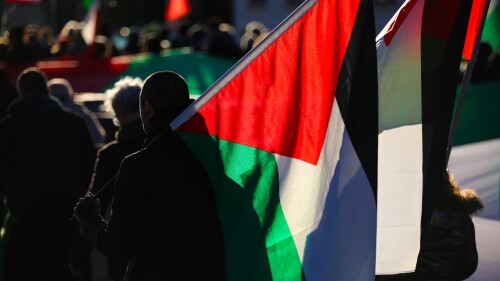The profound brutality that Syrian President Bashar Assad exhibited toward demonstrators during the 12 years since the eruption of the Arab Spring led him to be shunned by most of his Arab neighbors. Arab efforts to reintegrate Assad’s Syria back into the fold of Arab states have gained significant momentum for several years and are getting closer to fulfillment. All major U.S. Arab allies, with Qatar’s notable exception, have been steadily moving away from the U.S. stance and toward acceptance of Assad’s victory in the civil war.
It is important for the U.S. and Israel to view the reintegration of Syria as the likely outcome of current geopolitical shifts despite their wishes and thus to start calculating the opportunities and challenges that may emerge from such a new reality. Abhorrent as it may sound, Assad Won.
The Anti-Assad Camp Splinters
Shortly after the outbreak of the Syrian Civil War in 2011, Syria became a field in which the regional geopolitical alignments were drawn most sharply, pulling in all kinds of political actors. The main fault line was drawn between support for the regime of Bashar Assad, a security apparatus dominated by Alawaite leadership, and support for the Syrian opposition, a diverse incohesive body of political movements and militias opposing Assad. Russia, Iran, and Iranian proxy Hezbollah quickly rallied to support Assad and protect his rule regardless of humanitarian cost. The United States and its allies, namely, Saudi Arabia, Turkey, Qatar, and the United Arab Emirates, rallied to support the opposition hoping to overthrow Assad and end the brutal war.
This regional pit of dysfunction and hopelessness is also the prison of 16 million Syrians who are left to suffer violence, isolation, poverty, and natural disasters.
The former camp largely kept its posture and unity, while the latter coalition eventually fragmented into competing interests. The U.S. had misgivings about the heavy presence of al-Qaeda and other Jihadist groups among the opposition forces it supported, ultimately shifting its focus into countering the ISIS mission with the support of Kurdish troops.
Qatar insisted on continuing support for Jihadist and Islamist groups leading to a regional conflict with the anti-Islamist Arab camp led by Saudi Arabia and the Emirates. The latter two powers also developed misgivings about the American reluctance and lack of commitment to Arab interests leading to the significant empowerment of Iran and its allies as well as the rise of global jihadist nihilism, which they saw as facilitated by American and European incompetence. With Russian and Iranian support, Assad persevered.
The Failed State of Syria
Syria, which emerged from this prolonged conflict, is a shell of a country that contains nothing but the embodiment of regional and international failures paid for by millions of innocent Syrians. The country is fragmented between a Damascus corridor ruled by the Iranian-Russian-backed Assad regime, with its peripheries serving as operation grounds for Iranian militias and their activities against Israel as well as the former’s retaliation; a Kurdish no-fly zone protected by U.S. troops in which the Kurds are utterly dependent on American support for their security and livelihood; a Turkish enclave which is at odds with both former territories; and finally, various regions controlled by the remaining fragmented opposition groups and terrorist organizations.
This regional pit of dysfunction and hopelessness is also the prison of 16 million Syrians who are left to suffer violence, isolation, poverty, and natural disasters. In view of such a reality, many came to view the U.S. sanctions against Assad to be nonsensical. Assad and his generals are living posh opulent lives in their palaces protected by Iran and Russia and funded by the amphetamine trade of Captagon pills that is now Syria’s largest export while the Syrian people are the ones paying the price of everyone’s failure.
The opposition to Assad, simply put, no longer serves any Arab Gulf interests.
This is very briefly the picture that traditional U.S. Arab allies, namely Saudi Arabia and the United Arab Emirates, came to see in Syria. Not to mention how from the point of view of their interests, Syria became a large hub of narcotic trade that is threatening their population, an Iranian backwater, and a breeding ground for Jihadism.
The Interests of the Gulf States
While these Arab powers have no delusion about the destructive role Qatari and Iranian intervention played, they seem to hold the United States primarily responsible for the ultimate failure and dysfunction, a calculation that is central to their new strategic calculus that seeks to expand their foreign policy alliances beyond Washington. They view Assad, still young and likely to last another 20 years in office, as someone with nothing left to lose and who could sit happily in his palace in Damascus, letting his country become a large amphetamine lab and posing a serious hazard to Arab growth visions and plans for the region. Meanwhile, the Syrian people will remain isolated and unable to participate in the new economic visions of Riyadh and Abu Dhabi.
The opposition to Assad, simply put, no longer serves any Arab Gulf interests. Ultimately, along with the new calculus with Iran and China, this led Arab states, and even Turkey, to abandon the firm U.S. stance against Assad and seek his normalization, given he provided some concessions to the opposition.
The push for reintegration is led by Saudi Arabia, Jordan, and Syria and is already advanced enough for Assad to receive a presidential welcome in Abu Dhabi and receive the Saudi foreign minister in his palace in Damascus. The bid they launched to re-admit Syria into the Arab League was opposed by Qatar, which remains a patron of the Syrian opposition. Yet the Qatari rejection came with the caveat that it will stand as long as there are no concessions to the oppositions, which leaves the possibility open for the Qataris to agree, given their clients in Syria are protected. Even Turkey’s Erdogan, who is now more fearful of a Kurdish state than he is of Assad, announced that he is willing to meet with Assad and discuss the future relations between the two countries.
The U.S. and Israel Are Left Isolated
This ultimately leaves the U.S., and by extension, Israel, isolated from the current geopolitical shifts. Inside Washington, the foreign policy establishment seems to be divided on what should be done. Some officials are generally willing to consider the Arab efforts, given they require serious concessions from Assad, while others are completely opposed to the possibility.
The U.S. must face the reality that it cannot support the Kurds the way it is currently doing forever.
Regardless of how one morally feels about the unfortunate situation, it should be clear by now that Assad won, and we are the ones who have to deal with it. Arab states will help Assad reintegrate regionally and perhaps internationally, and it’s better for the U.S. to be part of the discussion in order to help shape the demands in a way conducive to both American and Israeli interests. If the U.S. continues to oppose this, it will happen anyway, however, without any regard for American or Israeli input. The U.S. must face the reality that it cannot support the Kurds the way it is currently doing forever, and failing to guarantee Kurdish interests in a new arrangement will ultimately hurt the Kurds and deal the last blow to any remnant of American credibility in the region.
Moreover, Israel has serious security interests in Syria, given the heavy presence of IRGC forces and militias. These security needs are becoming increasingly pressing given the rising prospects of a conflict with Iran over its nuclear program and an Arab wish to stay away from any such conflict leaving Israel to shoulder the cost alone.
Recognizing Reality
These and other calculations should push Washington to swallow its pride and start talking to Israel and its Arab allies about how best to shape the regional demands to be put in front of Assad in exchange for regional acceptance. This should not just be regarded as a foreign policy failure but a recognition of a bad situation that is in need of creative reorganization.
This does not mean that there are no risks in such a possibility. Assad, after all, committed crimes against his own people and oversaw some of the worst atrocities in recent history. Washington is right to view an acceptance of Assad as a major blow to international norms that the international community worked for a long time to establish. Moreover, there is no guarantee that rehabilitating Assad will prevent a repetition of the Saddam scenario where he reproduces his Baathist state in even more repressive forms or that he will be able to control Iranian activities in Syrian territories successfully. These are genuine risks that Washington should push Arab states not to undermine. Either way, Washington is better involved than absent in a region that is increasingly willing to go its own way.








